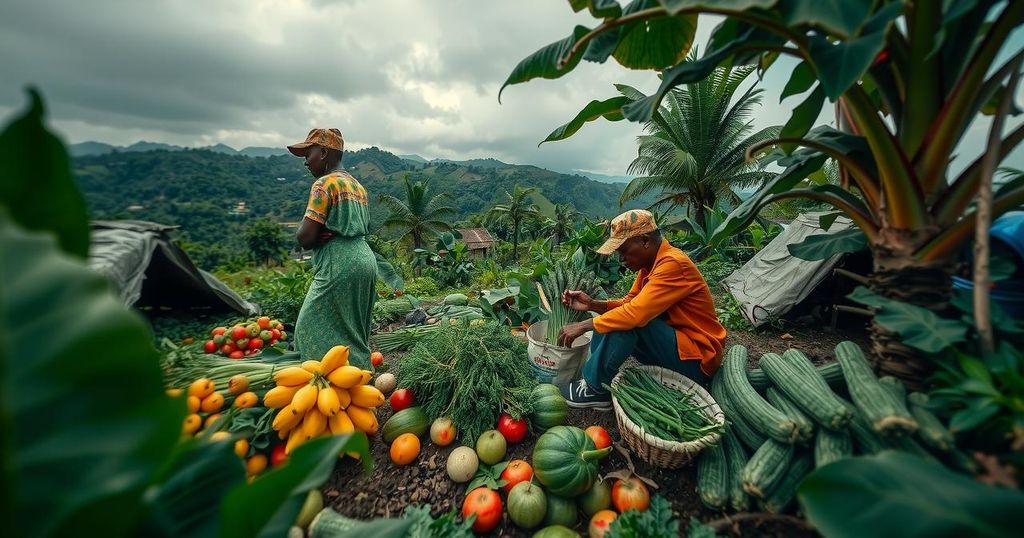High-level talks in the Democratic Republic of the Congo focused on food security and resilience amid ongoing hunger challenges. FAO Deputy Director-General Beth Bechdol and Prime Minister Judith Suminwa Tuluka discussed strengthening partnerships and scaling up livelihood initiatives for internally displaced persons. With 25 million people facing food insecurity in DRC, FAO aims to reduce dependence on aid through agricultural support. A press conference to summarize outcomes will be held on November 26.
Recent high-level discussions in Kinshasa focused on improving food security and resilience in the Democratic Republic of the Congo (DRC). The Food and Agriculture Organization (FAO) Deputy Director-General, Beth Bechdol, met with Prime Minister Judith Suminwa Tuluka to reinforce cooperation aimed at mitigating food insecurity and enhancing national resilience. Bechdol highlighted the necessity of scaling up livelihood initiatives within internally displaced persons (IDP) sites to complement essential food assistance.
The six-day FAO delegation, including Director of Emergencies and Resilience Rein Paulsen and Assistant Director-General Abebe Haile-Gabriel, aims to fortify partnerships and showcase strategies designed to tackle pressing needs in DRC. Prime Minister Tuluka, the nation’s first female leader, expressed gratitude for FAO’s partnership and assured ongoing support for mutual objectives.
Recent statistics reveal severe hunger affecting nearly 25 million people in the DRC, with projections indicating that this figure may reach 25.6 million by December 2024. Most IDP locations, particularly in North Kivu and South Kivu, report high levels of acute food insecurity. Deputy Director-General Bechdol underscored the FAO’s commitment to a holistic humanitarian response, which includes investment in agricultural livelihoods, thus reducing reliance on humanitarian aid over time.
During her visit, Bechdol toured the Rusayo 2 IDP Camp in Goma, home to over 30,000 displaced individuals living in dire conditions. FAO initiatives at the camp provide families with essential resources such as micro-gardening kits and livestock support to promote self-sufficiency. Agriculture’s importance is decisive as approximately 70% of the population depend on it for sustenance. Collaborative efforts with various partners aim to rebuild and sustain livelihoods, particularly for those impacted by ongoing conflicts.
Bechdol’s visit exemplifies FAO’s dedication to addressing systemic food insecurity through targeted interventions created within an international framework of support. A hybrid press conference will be held on November 26 to summarize the mission’s outcomes, inviting journalists to participate.
Contact for more details: Hyacine Kacou Amondji, FAO Democratic Republic of the Congo – Communications; Zoie Jones, FAO Regional Office for Africa – Communications.
Food insecurity remains a critical challenge in the Democratic Republic of the Congo, exacerbated by ongoing conflicts and instability. With a substantial portion of the population facing hunger, international organizations are stepping up efforts to provide assistance, focusing on both immediate food aid and long-term resilience strategies. The FAO is actively engaged in programmes designed to support vulnerable communities, particularly those displaced by conflict, through agricultural initiatives and livelihood support. Building resilience is essential for reducing dependency on humanitarian aid and promoting sustainable food systems in the region.
The high-level discussions in the DRC reflect a concerted effort by the FAO and national authorities to address the urgent issue of food insecurity. By promoting collaborative strategies that focus on enhancing agricultural productivity and resilience among vulnerable populations, FAO is working to alleviate hunger and build sustainable livelihoods. The ongoing commitment from both the FAO and the DRC government is critical in combating the widespread hunger affecting millions across the country.
Original Source: www.fao.org






